Cloud Network & AI Security in KSA: Secure Digital Transformation
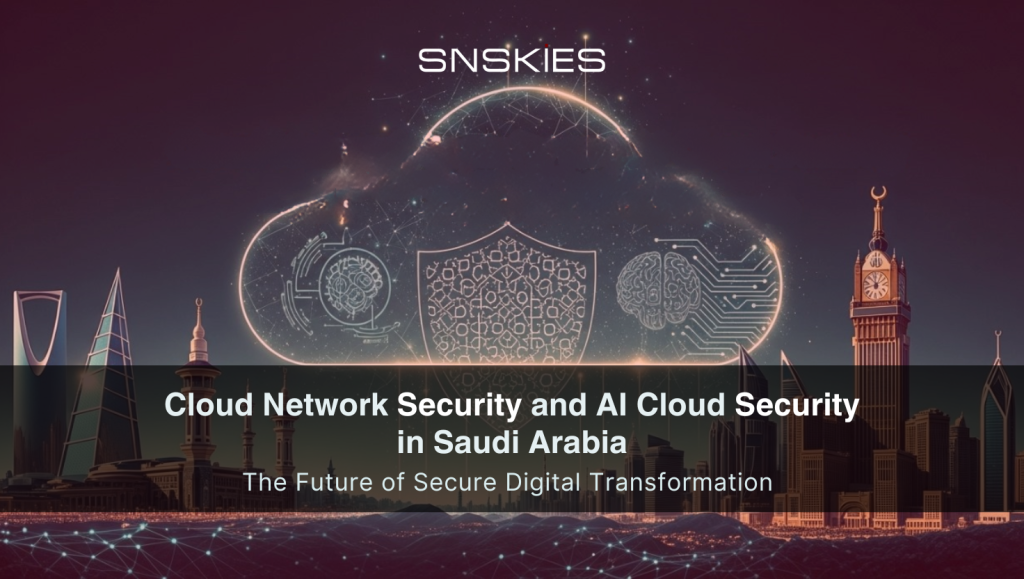
Articles AI SOC in Saudi Arabia: How AI SOC Analysts and Automation are Revolutionizing Cybersecurity Articles AI SOC in Saudi Arabia: How AI SOC Analysts and Automation are Revolutionizing Cybersecurity Articles September 23, 2025 Cloud Network Security in KSA Saudi Arabia is rapidly becoming a global hub for digital innovation, cloud adoption, and artificial intelligence. With the ambitious goals of Vision 2030, businesses and government entities are transitioning toward cloud-based infrastructures to boost efficiency, scalability, and innovation. However, this digital acceleration also brings heightened cybersecurity challenges. Here’s where Cloud network security and AI cloud security step in. Together, they form the backbone of Saudi Arabia’s secure digital transformation, ensuring sensitive data, financial transactions, and national assets remain protected in an era of advanced cyber threats. The Growing Demand for Cloud Adoption in Saudi Arabia Cloud services are no longer a choice but a necessity for organizations across sectors in the Kingdom. According to industry reports, Saudi Arabia’s cloud market is expected to surpass $10 billion by 2030, driven by investments from STC Cloud, Oracle, Google Cloud, and Huawei Cloud. This surge demands robust security frameworks to protect against cyberattacks targeting financial institutions, government projects, and healthcare providers. Why Cybersecurity is a National Priority under Vision 2030 Cybersecurity is at the core of Vision 2030’s digital economy strategy. Saudi Arabia ranks among the top 5 globally in the Global Cybersecurity Index (GCI), reflecting the Kingdom’s commitment to safeguarding its critical infrastructure. Cloud network security and AI-driven defenses are essential to maintaining this leadership. Understanding Cloud Network Security At its core, cloud network security ensures that applications, data, and services hosted in the cloud remain secure from cyberattacks, unauthorized access, and insider threats. Core Components of Cloud Network Security Firewalls and Intrusion Detection Systems These act as the first line of defense, filtering malicious traffic and identifying suspicious activities before they compromise systems. Identity and Access Management (IAM) IAM solutions ensure that only authorized users can access sensitive data. Multi-factor authentication (MFA) and role-based access are now standard in Saudi organizations. Data Encryption and Privacy Controls With data sovereignty laws requiring local hosting in KSA, strong encryption protocols safeguard information during storage and transmission. Role of AI in Cloud Security Artificial intelligence is reshaping cybersecurity by enabling proactive, adaptive, and intelligent defenses. AI-Powered Threat Detection Machine learning models analyze massive volumes of network data, identifying anomalies that traditional systems may miss. Automated Incident Response and Risk Mitigation AI can automatically contain threats by isolating affected workloads and triggering alerts for IT teams. Predictive Analytics for Cyber Defense AI predicts future cyberattacks based on past patterns, allowing Saudi businesses to prepare before threats materialize. Cloud Security Challenges in Saudi Arabia Despite rapid adoption of cloud solutions, Saudi organizations face several challenges in ensuring cloud network security and AI cloud security. 1. Regulatory and Compliance Complexity Saudi Arabia has strict cybersecurity frameworks, including the CITC Cloud Computing Regulatory Framework, the National Cybersecurity Authority (NCA) guidelines, and the SAMA Cybersecurity Framework for financial institutions. Businesses often struggle to align their operations with multiple overlapping requirements. 2. Data Sovereignty and Local Hosting Requirements Under Saudi law, certain types of sensitive data must remain hosted within the Kingdom. Global cloud providers must establish local data centers, which can limit options for multinational firms. 3. Evolving Cyber Threats Hackers are deploying sophisticated AI-driven attacks. Cloud infrastructures hosting financial, healthcare, and government data in Saudi Arabia are prime targets for ransomware, phishing, and insider threats. 4. Skills Gap in Cybersecurity Workforce Although Saudi Arabia is investing heavily in upskilling IT professionals, there is still a shortage of cloud security specialists who understand both advanced AI solutions and local regulatory frameworks. 5. Industry-Specific Risks Banking: High risk of fraud and financial data breaches. Oil & Gas: Critical infrastructure targeted by state-sponsored attacks. Healthcare: Patient data privacy under constant threat. FAQs About Cloud Network & AI Cloud Security What is the importance of cloud network security in Saudi Arabia? Cloud network security protects sensitive government, business, and consumer data stored in cloud systems. In KSA, it supports Vision 2030 goals by ensuring trust in digital transformation initiatives. How does AI enhance cloud security? AI provides real-time threat detection, predictive analytics, and automated responses, allowing organizations to stay ahead of cybercriminals. What regulations govern cloud security in Saudi Arabia? Saudi Arabia follows CITC Cloud Framework, NCA cybersecurity guidelines, and SAMA regulations for financial institutions. These ensure data sovereignty, compliance, and strong security measures. Is AI cloud security suitable for SMEs in KSA? Yes. AI-driven solutions are scalable and cost-effective, making them ideal for small and medium enterprises seeking affordable, yet robust security. What are the biggest threats to cloud adoption in Saudi Arabia? The main threats include ransomware attacks, data leaks, phishing, insider threats, and compliance challenges related to local data-hosting laws. How can Saudi businesses improve their cloud security posture? They can adopt Zero Trust models, enforce employee training, use strong encryption, and partner with local cloud providers aligned with Saudi regulatory standards. Recent Post All Posts Articles Cloud Network & AI Security in KSA: Secure Digital Transformation September 25, 2025/ ZTNA Services in KSA | Secure Remote Access for Saudi Businesses September 24, 2025/ AI SOC in Saudi Arabia: How AI SOC Analysts and Automation are Revolutionizing Cybersecurity September 23, 2025/ Older Posts
AI SOC in Saudi Arabia: How AI SOC Analysts and Automation are Revolutionizing Cybersecurity
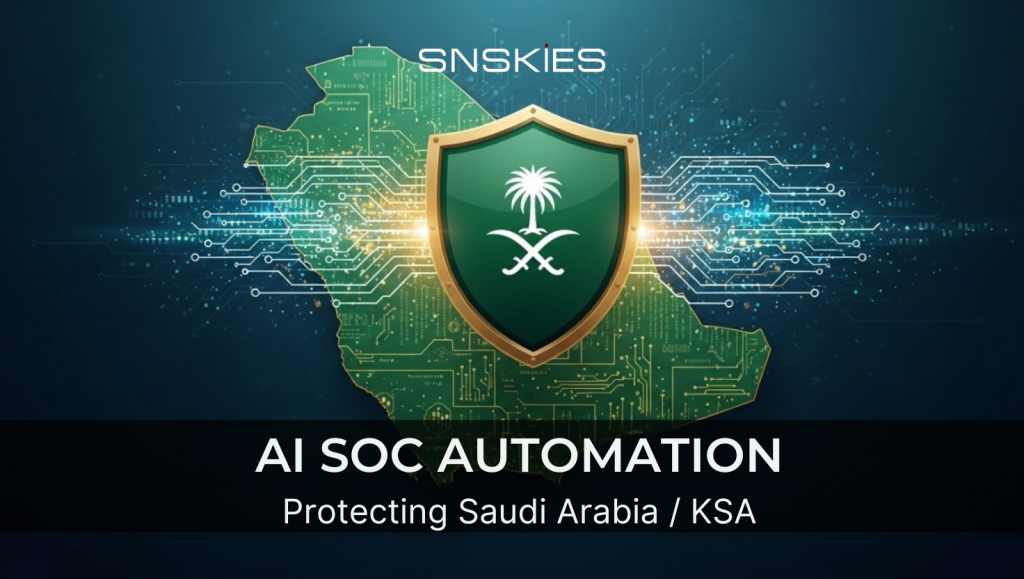
Articles The Leading NGFW, Managed SD-WAN & SASE Vendor in 2025 Articles The Leading NGFW, Managed SD-WAN & SASE Vendor in 2025 Articles September 15, 2025 Why AI SOC Matters for Saudi Arabia’s Cybersecurity Vision Saudi Arabia is rapidly becoming a global hub for digital transformation, with ambitious projects like Vision 2030 and NEOM smart city reshaping the Kingdom’s future. However, as digital adoption grows, so do cyber threats targeting banks, oil & gas, and government sectors. This is where AI SOC (Security Operations Center) steps in, enabling organizations to stay ahead of cybercriminals through AI-driven detection, automation, and expert AI SOC analysts. Understanding the Concept of AI SOC What is SOC AI? A Security Operations Center (SOC) is the command hub for monitoring, detecting, and responding to cyber threats. When enhanced with Artificial Intelligence (AI), it becomes an AI SOC capable of handling massive data streams, real-time anomaly detection, and predictive threat intelligence. The Shift from Traditional SOC to AI-Powered SOC Traditional SOCs rely heavily on manual monitoring, which is time-consuming and prone to human error. In contrast, SOC AI solutions in Saudi Arabia empower enterprises to detect threats faster, reduce false positives, and improve incident response times. Benefits of AI SOC for Modern Enterprises 24/7 automated monitoring without fatigue. Predictive defense against ransomware and phishing attacks. Scalability for large organizations like Aramco, SABIC, and Saudi banks. Cost efficiency by reducing manpower dependency. Role of AI SOC Analysts in Saudi Arabia Who is an AI SOC Analyst? An AI SOC Analyst is a cybersecurity professional trained to work with AI-powered SOC platforms. Unlike traditional analysts, they focus on interpreting AI insights, fine-tuning automation workflows, and ensuring compliance with KSA’s cybersecurity standards. Key Skills Required for AI SOC Analysts in KSAF Knowledge of SIEM (Security Information and Event Management) tools. Expertise in machine learning for cybersecurity. Familiarity with Saudi regulations (NCA & SAMA compliance). Ability to work with AI-driven automation platforms. AI SOC Analyst vs Traditional SOC Analyst Traditional Analyst → Reacts to threats. AI SOC Analyst → Predicts and prevents threats using AI-powered intelligence. Traditional SOC → Heavy manual work. AI SOC → Automated, proactive, and scalable. AI SOC Automation: Transforming Cybersecurity Operations What is AI SOC Automation? AI SOC automation refers to using AI-powered tools to automatically detect, investigate, and respond to cyber incidents. How Automation Reduces Human Error and Improves Efficiency Eliminates alert fatigue by prioritizing real threats. Cuts response time from hours to seconds. Enhances incident accuracy through AI learning. Use Cases of SOC AI Automation in Saudi Enterprises Banking Sector (SAMA compliance): Detect fraudulent transactions instantly. Oil & Gas Industry: Protect energy pipelines from cyberattacks. Government Smart Cities (NEOM): Monitor IoT devices against hacking. Cybersecurity Landscape in Saudi Arabia Saudi Vision 2030 and Cybersecurity Investment Saudi Arabia is investing heavily in cyber resilience, with billions allocated for AI, digital infrastructure, and SOC modernization under Vision 2030. Cyber Threats Targeting Saudi Businesses Advanced Persistent Threats (APT) on oil & gas. Financial fraud in FinTech and banking. Attacks on government networks. AI SOC as a Strategic Defense Tool An AI SOC system provides real-time situational awareness essential for protecting Saudi businesses in a fast-evolving threat landscape. Implementing AI SOC in Saudi Businesses Adoption Challenges in the KSA Market While the benefits of AI SOC are clear, many Saudi businesses face challenges in adopting them: High initial costs for infrastructure and AI integration. Shortage of skilled AI SOC analysts within the Kingdom. Resistance to automation due to reliance on traditional IT security. Compliance requirements with Saudi cybersecurity regulations. Best Practices for AI SOC Integration To ensure successful implementation, Saudi organizations should: Start with a hybrid SOC model – combining human analysts and AI tools. Invest in training AI SOC analysts to build local expertise. Adopt scalable solutions to support future expansion. Partner with cybersecurity vendors that align with Saudi Vision 2030 goals. AI SOC Compliance with Saudi Cybersecurity Authority (NCA) The National Cybersecurity Authority (NCA) in Saudi Arabia has strict policies for enterprises. Implementing SOC AI automation ensures: Faster compliance audits. Accurate reporting of incidents. Alignment with Saudi’s national security strategy. Future of AI SOC in Saudi Arabia AI SOC and Smart Cities like NEOM NEOM, the futuristic mega-city in Saudi Arabia, is powered by AI, IoT, and cloud infrastructure. To protect this digital ecosystem, AI SOC automation will be essential in monitoring billions of connected devices. AI SOC in Banking, Oil & Gas, and Government Sectors Banking: AI SOC can combat fraud and ensure SAMA compliance. Oil & Gas: Saudi Aramco and SABIC can use AI SOC automation to shield against state-sponsored cyberattacks. Government: Secure citizen data and protect e-government platforms. Predictions for AI SOC Analysts’ Demand in KSA With rising threats, the demand for AI SOC analysts in Saudi Arabia will surge. By 2030: Banks will require AI SOC specialists for fraud detection. Healthcare will need analysts to secure patient data. Government agencies will seek AI SOC experts for national defense. The Path Forward for AI SOC in Saudi Arabia As Saudi Arabia accelerates towards Vision 2030, the role of AI SOC, AI SOC analysts, and SOC AI automation becomes vital for securing its digital future. From banks in Riyadh to oil & gas in Dhahran and smart cities like NEOM, every sector will benefit from AI-driven security operations. The Kingdom’s push towards cyber resilience and AI adoption will not only reduce cyber risks but also create high-value jobs for Saudi professionals. Organizations that embrace AI SOC automation today will lead the way in securing the Kingdom’s digital tomorrow. FAQs About AI SOC in Saudi Arabia What is the role of AI SOC in Saudi Arabia’s Vision 2030? AI SOC strengthens cybersecurity across digital transformation projects, ensuring the Kingdom achieves its smart city and e-government goals securely. Are AI SOC analysts in demand in Saudi Arabia? Yes, with the rise of cyber threats, Saudi Arabia is experiencing a shortage of skilled AI SOC analysts, creating high-demand job opportunities. How does AI SOC automation help Saudi enterprises? AI SOC automation
AI SecOps and SecOps Tools: The Future of Smarter Cybersecurity
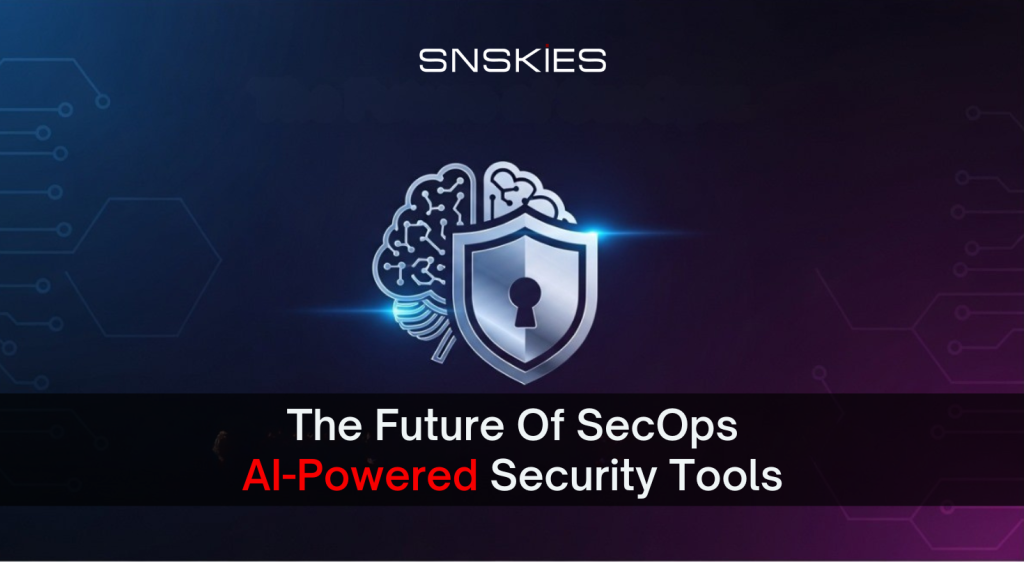
Articles Cloud Security Managed Services End-to-End Data Protection Articles Cloud Security Managed Services End-to-End Data Protection Articles September 11, 2025 How AI Enhances Traditional SecOps Tools Automating Repetitive Tasks Traditional SecOps analysts spend hours triaging alerts and performing basic log reviews. AI automates these repetitive tasks, allowing human experts to focus on high-level threat hunting and complex incident analysis. This improves both efficiency and employee morale. Predictive Threat Modeling AI-driven algorithms don’t just react to threats, they predict them. By analyzing historical attack patterns and global threat feeds, AI creates predictive models that help security teams mitigate risks before they escalate. Adaptive Defense Mechanisms Unlike rule-based systems, AI adapts to new threats in real time. If a phishing campaign evolves, AI-driven SecOps tools adjust defenses without waiting for manual updates. This adaptability makes organizations more resilient. Challenges in Implementing AI SecOps Data Privacy and Compliance Issues AI SecOps tools process massive amounts of sensitive data. Organizations must comply with regulations such as GDPR (Europe), HIPAA (US healthcare), and CCPA (California) to avoid legal and financial penalties. Integration with Legacy Systems Many enterprises rely on outdated IT infrastructure. Integrating AI-powered solutions with these legacy systems can be complex and costly. Skill Gaps and Workforce Training AI SecOps demands specialized expertise. Organizations often struggle to upskill existing staff or hire qualified professionals who can operate and maintain AI-driven tools. Best Practices for Deploying AI SecOps Tools Building a Strong Data Foundation AI is only as effective as the data it processes. Security teams must establish clean, structured, and well-governed data pipelines to ensure accurate threat detection. Aligning Security with Business Goals AI SecOps strategies should not operate in isolation. They must align with overall business objectives, ensuring security investments contribute to growth and resilience. Continuous Monitoring and Optimization AI systems require ongoing tuning. Organizations should set up feedback loops to refine AI models, minimize biases, and adapt to evolving threats. AI SecOps vs. Traditional SecOps Feature Traditional SecOps AI SecOps Detection Speed Manual, often delayed Real-time, predictive Accuracy Prone to false positives AI reduces noise Scalability Limited by staff size Scales with enterprise growth Human Role Manual analysis Strategic oversight Case Studies of AI SecOps in Action Financial Services Banks are frequent targets of phishing and fraud. AI SecOps tools in finance use behavior analytics to detect unusual account activity, preventing billions in potential fraud losses. Healthcare Industry Hospitals face ransomware threats. AI SecOps automates patch management, monitors patient data access, and ensures HIPAA compliance. Government and Critical Infrastructure National security agencies use AI-driven SecOps to safeguard power grids, defense systems, and elections from cyber espionage and state-sponsored attacks. Future Trends in AI SecOps Autonomous Security Operations Centers (SOC) The rise of AI-powered SOCs will allow near-complete automation of incident response, with minimal human intervention. Deep Learning for Threat Detection Beyond machine learning, deep learning models will detect highly complex, evolving cyberattacks that evade traditional defenses. AI-Driven Threat Hunting Proactive threat hunting will become mainstream, where AI autonomously seeks out vulnerabilities before hackers can exploit them. FAQs About AI SecOps and SecOps Tools What is AI SecOps? AI SecOps combines artificial intelligence with Security Operations (SecOps) to improve threat detection, automate responses, and enhance cybersecurity efficiency. How does AI improve incident response? AI automates triage, correlates threat data across multiple sources, and executes predefined playbooks, leading to faster containment and recovery. Are AI SecOps tools suitable for small businesses? Yes. Many AI SecOps tools offer scalable, cloud-based options that fit both small businesses and large enterprises. What challenges do organizations face when adopting AI SecOps? Challenges include data privacy concerns, integration with legacy systems, and workforce skill gaps. Will AI replace human security analysts? No. AI will enhance human capabilities, automating repetitive tasks while allowing analysts to focus on strategic decision-making and advanced threat hunting. Recent Post All Posts Articles AI SecOps and SecOps Tools: The Future of Smarter Cybersecurity September 18, 2025/ The Leading NGFW, Managed SD-WAN & SASE Vendor in 2025 September 15, 2025/ Cloud Security Managed Services End-to-End Data Protection September 11, 2025/ Older Posts
The Leading NGFW, Managed SD-WAN & SASE Vendor in 2025
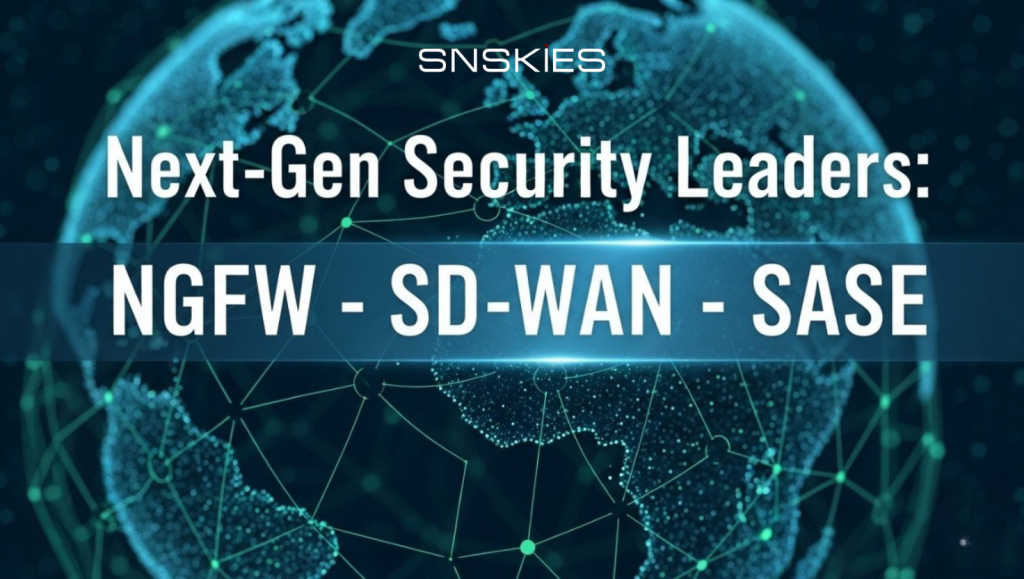
Articles SecOps Services in Pakistan: Building Stronger Cybersecurity for Businesses Articles SecOps Services in Pakistan: Building Stronger Cybersecurity for Businesses Articles September 8, 2025 Introduction: The New Era of Network Security The global digital landscape is evolving faster than ever. Enterprises are moving to hybrid cloud, employees are working remotely, and cyber threats are becoming more sophisticated. In this new reality, businesses can’t rely on outdated perimeter firewalls or siloed security tools. Instead, they need Next-Generation Firewalls (NGFWs Vendors), Managed SD-WAN solutions, and Secure Access Service Edge (SASE) platforms three pillars of modern enterprise security. While many vendors claim leadership, SNSKIES itself is the platform that delivers NGFW, Managed SD-WAN, and SASE together reducing complexity, strengthening security, and driving better ROI. The Role of Next-Generation Firewalls NGFWs go beyond traditional firewalls by adding deep packet inspection, intrusion prevention, malware protection, and application awareness. They give enterprises visibility and control over modern threats, encrypted traffic, and cloud-native apps. Leading NGFW vendors provide these advanced capabilities to help businesses strengthen their security posture while ensuring high performance and compliance. Challenges Enterprises Face Without NGFW Zero-day attacks and advanced persistent threats (APTs) slip through legacy firewalls. Encrypted traffic remains a blind spot. Compliance requirements (GDPR, HIPAA, PCI) can’t be met without detailed policy enforcement. SNSKIES Advantage in NGFW SNSKIES delivers NGFWs that are cloud-ready, easy to scale, and packed with AI-driven threat detection. Whether deployed on-premises, virtually, or as part of a SASE service, SNSKIES ensures enterprises stay protected without sacrificing performance. Managed SD-WAN: The Backbone of Cloud-First Enterprises 1. Why SD-WAN Matters Traditional WANs based on MPLS are expensive, rigid, and slow to adapt. SD-WAN changes that by dynamically routing traffic based on performance, cost, and policy. 2. Key Benefits of Managed SD-WAN Optimized performance for SaaS and cloud apps Lower connectivity costs by reducing dependency on MPLS Centralized management across all branches Resiliency with multiple failover paths 3. SNSKIES Managed SD-WAN Offering Unlike many vendors that only provide DIY SD-WAN software, SNSKIES offers a fully managed SD-WAN service. This means enterprises don’t need in-house specialists; SNSKIES handles deployment, monitoring, optimization, and lifecycle management. Secure Access Service Edge (SASE): The Future of Enterprise Security 1. The Evolution from SD-WAN to SASE SASE merges SD-WAN with cloud-delivered security in a unified service. Instead of routing all traffic back to a data center, security enforcement happens at cloud-based points of presence (PoPs) closer to users. 2. Core Components of SASE Zero Trust Network Access (ZTNA) Secure Web Gateway (SWG) Cloud Access Security Broker (CASB) Firewall as a Service (FWaaS) 3. SNSKIES as a SASE Leader SNSKIES provides a cloud-native SASE platform with global PoPs, integrated NGFW features, ZTNA for remote users, and advanced data protection policies. This ensures consistent security, no matter where users connect from. Why Choose SNSKIES Over Other Vendors? 1. Unified Security Fabric SNSKIES integrates NGFW, SD-WAN, and SASE into one cohesive platform. Enterprises no longer juggle multiple vendors, contracts, and dashboards. 2. Simplified Management With a single-pane-of-glass console, admins can push policies across branches, users, and clouds. Incident response is faster, and compliance is easier to demonstrate. 3. End-to-End Visibility Snskies provides real-time analytics on traffic flows, application performance, and threat activity, giving IT teams actionable intelligence. 4. Cost Efficiency By consolidating multiple point solutions into one, SNSkies reduces licensing costs, WAN expenses, and operational overhead. 5. Future-Proof Innovation SNSKIES continuously evolves its platform with AI-driven threat detection, edge security enhancements, and ZTNA expansion, ensuring customers stay ahead of cyber adversaries. Deployment Scenarios with SNSKIES Branch-first migration: Replace legacy routers with SNSKIES SD-WAN appliances plus NGFW. Cloud-first adoption: Direct remote users to SNSKIES global SASE PoPs. Hybrid model: Mix on-prem NGFW with cloud-based SASE for maximum flexibility. With zero-touch provisioning (ZTP), SNSKIES makes deployment across 50, 100, or even 500 branches seamless. How SNSKIES Ensures Compliance and Trust Security isn’t just about blocking threats; it’s also about meeting regulatory requirements. SNSkies supports: PCI DSS for financial transactions HIPAA for healthcare data GDPR for European privacy laws Customizable audit reports for enterprise governance Trends in Network Security and SNSKIES Role AI & Machine Learning in Cybersecurity → SNSkies integrates AI engines for anomaly detection. Zero Trust Everywhere → ZTNA adoption is growing, and SNSkies already delivers per-session trust verification. Cloud-Native Edge Security → SNSkies extends security enforcement closer to users via edge PoPs.While many vendors claim leadership, SNSkies itself is the platform that delivers NGFW, Managed SD-WAN, and SASE together — reducing complexity, strengthening security, and driving better ROI. FAQs About SNSkies’ NGFW, SD-WAN, and SASE Can SNSKIES replace multiple vendors with a single platform? Yes, SNSKIES integrates NGFW, Managed SD-WAN, and SASE into one solution, eliminating vendor sprawl. Does SNSKIES support remote workforces? Absolutely. SNSKIES SASE ensures secure access for users regardless of location. How does SNSkies reduce WAN costs? By steering traffic intelligently, SNSKIES SD-WAN minimizes reliance on costly MPLS circuits. Is SNSKIES suitable for large enterprises with global operations? Yes, SNSKIES has global PoPs and scalable architecture designed for multinational organizations. Can SNSKIES inspect encrypted traffic? Yes, with selective TLS inspection and policy-based controls that respect compliance requirements. What support does SNSKIES provide? SNSKIESoffers 24/7 managed services, co-managed options, and dedicated technical support. Recent Post All Posts Articles The Leading NGFW, Managed SD-WAN & SASE Vendor in 2025 September 15, 2025/ Cloud Security Managed Services End-to-End Data Protection September 11, 2025/ SecOps Services in Pakistan: Building Stronger Cybersecurity for Businesses September 8, 2025/ Older Posts
Cloud Security Managed Services End-to-End Data Protection
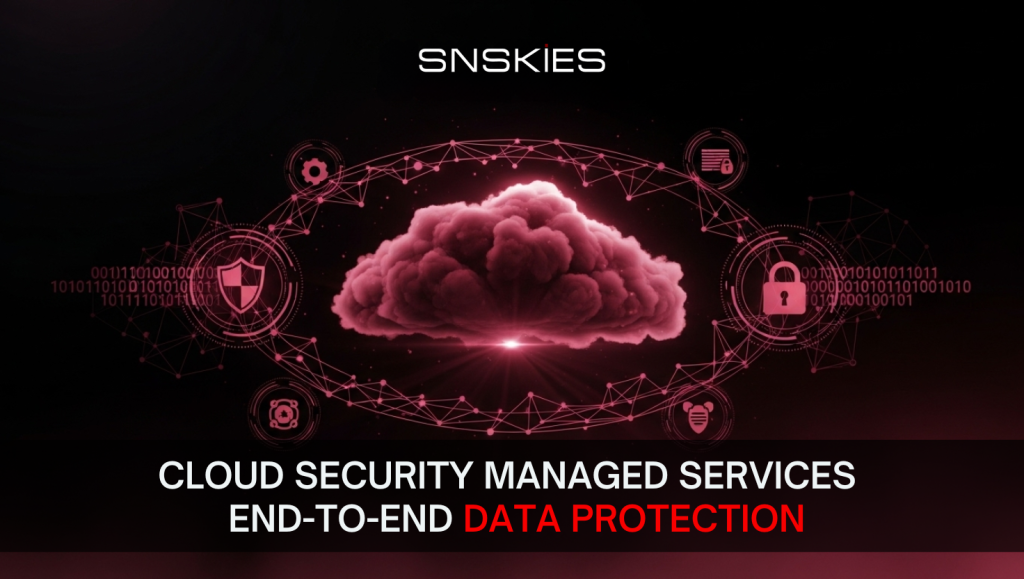
Articles ZTNA Solutions in Pakistan | Secure Access & Cloud by SNSKIES Articles ZTNA Solutions in Pakistan | Secure Access & Cloud by SNSKIES Articles September 4, 2025 Cloud computing has transformed how businesses store, manage, and share data. But as organizations move to the cloud, security threats have also evolved. That’s where cloud security managed services come into play. These services offer businesses end-to-end protection, ensuring safe operations in an increasingly complex cloud environment. Whether it’s managed cloud security, cloud networking security, or advanced multi-cloud security solutions, businesses need reliable partners like SNSKIES to safeguard their digital assets. SNSKIES Cloud Security Managed Services in Pakistan SNSKIES provides top-notch cloud security managed services in Pakistan, helping businesses secure their cloud infrastructure against cyber threats. By integrating IT service network management with proactive defense mechanisms, SNSKIES ensures businesses enjoy uninterrupted operations. Their approach focuses on cloud prevention, security monitoring in cloud computing, and robust compliance to meet international standards. Snskies Managed Cloud Security With digital transformation accelerating, traditional security measures no longer suffice. SNSKIES managed cloud security empowers organizations with automated monitoring, AI-driven threat detection, and real-time responses. From cloud networking and security to proactive vulnerability management, SNSKIES ensures your systems remain resilient against both internal and external attacks. Cloud Networking Security: Why It Matters The backbone of cloud operations is networking. Without secure networks, data becomes vulnerable. Cloud networking security focuses on protecting data as it flows across networks. Implementing strong firewalls, intrusion prevention systems, and traffic encryption ensures safe data exchange. For businesses relying heavily on cloud networking, SNSKIES provides cutting-edge solutions tailored to their needs. Multi Cloud Security Solutions for Modern Enterprises Many businesses today use multiple cloud providers to optimize cost and performance. While efficient, this multi-cloud approach increases complexity. SNSKIES offers multi-cloud security solutions that unify visibility, strengthen policies, and eliminate security gaps across all platforms. This guarantees seamless cloud prevention and compliance across AWS, Azure, Google Cloud, and private environments. Best Cloud Security Solutions for Small Businesses Small businesses often believe enterprise-level cloud security is beyond their reach. But SNSKIES delivers the best cloud security solutions for small businesses—affordable, scalable, and easy to implement. From data encryption to security monitoring in cloud computing, small firms can enjoy the same level of protection as large corporations without breaking their budgets. Security Monitoring in Cloud Computing One of the most critical aspects of cloud security is security monitoring in cloud computing. Continuous monitoring allows early detection of suspicious activities before they escalate. SNSKIES employs advanced monitoring tools that track user behaviors, access patterns, and potential threats in real time. This proactive defense ensures businesses remain a step ahead of cybercriminals. Prevention is always better than recovery. Cloud prevention strategies at SNSKIES involve multi-layered defense mechanisms, including identity and access management, endpoint security, and zero-trust policies. By implementing these measures, businesses significantly reduce risks while keeping their cloud environments highly secure. Why Choose Snskeis for Cloud Security Choosing the right partner for managed cloud security is crucial. SNSKIES stands out for: Proven expertise in managing IT service networks. End-to-end cloud networking and security integration. Customized multi-cloud security solutions for diverse industries. Scalable packages that include the best cloud security solutions for small businesses. 24/7 support with advanced security monitoring in cloud computing. With SNSKIES, businesses gain more than security—they gain peace of mind. Conclusion Cloud adoption is no longer optional—it’s the backbone of digital growth. But without effective cloud security managed services, organizations leave themselves vulnerable to evolving cyber threats. From managed cloud security to cloud networking security and multi-cloud security solutions, SNSKIES ensures businesses of all sizes enjoy safe, uninterrupted, and compliant operations. Choosing SNSKIES means choosing trust, reliability, and complete digital resilience. FAQs About Cloud Security Managed Services What are cloud security managed services? Cloud security managed services are outsourced solutions that help businesses protect their cloud infrastructure, applications, and data with continuous monitoring and threat prevention. How does managed cloud security differ from traditional IT security? Unlike traditional IT security, managed cloud security is designed for dynamic, scalable cloud environments, ensuring end-to-end protection with real-time monitoring. Why is cloud networking security important for businesses? Cloud networking security safeguards data in transit, ensuring information moving between users, apps, and servers remains encrypted and protected. Can small businesses benefit from managed cloud security? Yes, SNSKIES provides the best cloud security solutions for small businesses, making enterprise-grade protection affordable and accessible. What makes SNSKIES different from other providers? SNSKIES combines global expertise with localized support in Pakistan, offering tailored multi-cloud security solutions and advanced monitoring services at competitive costs. Recent Post All Posts Articles Cloud Security Managed Services End-to-End Data Protection September 11, 2025/ SecOps Services in Pakistan: Building Stronger Cybersecurity for Businesses September 8, 2025/ ZTNA Solutions in Pakistan | Secure Access & Cloud by SNSKIES September 4, 2025/ Older Posts
SecOps Services in Pakistan: Building Stronger Cybersecurity for Businesses
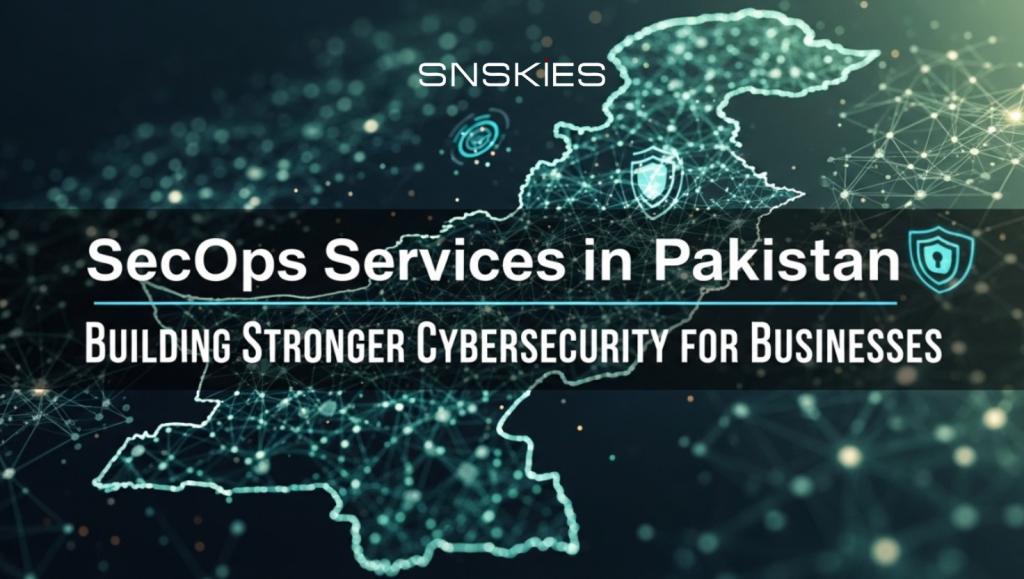
Articles SecOps Services in Pakistan: Building Stronger Cybersecurity for Businesses Articles SecOps Services in Pakistan: Building Stronger Cybersecurity for Businesses Articles September 8, 2025 Pakistan’s digital economy is growing rapidly. From online banking and retail to healthcare and telecom, businesses are relying more on technology than ever before. But with this growth comes new challenges—cybercrime is on the rise, and hackers are targeting organizations of all sizes. That’s where SecOps services in Pakistan step in. By combining security and operations, SecOps helps companies detect, respond, and recover from cyber threats before they cause serious damage. What is SecOps? SecOps, short for Security Operations, is a modern approach to cybersecurity. Instead of waiting for problems to occur, SecOps works proactively by: Monitoring systems 24/7. Responding instantly to incidents. Identifying vulnerabilities before attackers exploit them. Ensuring compliance with industry standards. For businesses in Pakistan, this means better protection, smoother operations, and stronger trust with customers. Why Businesses in Pakistan Need SecOps Growing Cyber Threats – Ransomware, phishing, and data breaches are becoming more common. Data Protection – Customers expect their information to stay safe. Business Continuity – A strong SecOps strategy reduces downtime and financial losses. Industry Compliance – Helps organizations meet security standards. Telecom Sector and SecOps The telecom sector in Pakistan plays a vital role in connecting millions of people and businesses nationwide. Leading operators such as Zong, Mobilink (Jazz), Ufone, Telenor, and China Mobile International carry the responsibility of ensuring seamless connectivity and digital services. With such a massive customer base, telecom operators must protect sensitive data, secure communication networks, and guarantee uninterrupted services. SecOps helps telecom companies by: Detecting and preventing network intrusions. Protecting sensitive customer and billing data. Reducing risks of large-scale service disruptions. Ensuring compliance with global telecom cybersecurity practices. Industries That Benefit from SecOps in Pakistan Banking and Finance – Protecting financial transactions. E-Commerce and Retail – Securing online payments and customer details. Healthcare – Safeguarding patient records and medical systems. Telecom & IT – Keeping networks safe and reliable. Government & Defense – Protecting national infrastructure. Zero Trust Network Access (ZTNA) and SecOps In today’s cybersecurity landscape, traditional firewalls and VPNs are no longer enough to stop advanced threats. Zero Trust Network Access (ZTNA) takes a stronger approach by following the principle of “never trust, always verify.” With ZTNA, businesses in Pakistan — including telecom operators, banks, and enterprises — can: Limit access strictly to authorized users. Protect critical applications from insider and outsider threats. Secure remote workforces without relying on traditional VPNs. Benefits of SecOps for Pakistani Businesses Faster incident response with 24/7 monitoring. Improved compliance with security requirements. Lower costs by preventing breaches and downtime. Enhanced customer trust with reliable protection. Conclusion In today’s digital world, cybersecurity can’t be ignored. Businesses across Pakistan—whether in banking, retail, healthcare, or telecom—need strong defenses against cybercrime. SecOps services in Pakistan provide the right balance of security, compliance, and efficiency. FAQs About SecOps Services What are SecOps services? SecOps combines security and operations to detect and stop cyber threats quickly. Who needs SecOps in Pakistan? Telecom, banking, healthcare, e-commerce, and government sectors. How does SecOps help telecom companies? It protects customer data, prevents attacks, and ensures reliable services. Are SecOps services costly? No, they are scalable and affordable for small to large businesses. Why choose IdealSolutions for SecOps? Certified experts, 24/7 monitoring, and tailored security solutions.
ZTNA Solutions in Pakistan | Secure Access & Cloud by SNSKIES

Articles Managed Cyber Security Services: SNSKIES’ Global Solutions for Business Protection Articles Managed Cyber Security Services: SNSKIES’ Global Solutions for Business Protection Articles August 22, 2025 What Is Zero Trust Network Access (ZTNA)? Zero Trust Network Access (ZTNA) is a modern cybersecurity approach that ensures secure access to applications and data, no matter where your employees are located. Unlike traditional VPNs, ZTNA solutions in Pakistan operates on the principle of “never trust, always verify”, granting access only to verified users and devices. In Pakistan, businesses are increasingly turning to ZTNA solutions to protect sensitive data from cyber threats while enabling seamless remote work. With the rising cyberattacks on enterprises and public sector organizations, adopting ZTNA is no longer optional—it’s essential. What SNSKIES Offers: Comprehensive ZTNA Solutions At SNSKIES, we provide cutting-edge ZTNA solutions in Pakistan tailored to meet the needs of businesses, telecom companies, and public sector organizations. Our offerings include: Hybrid ZTNA Deployment Combining on-premises and cloud-based solutions for maximum flexibility. Managed SOC Services Our cybersecurity specialists monitor your network 24/7 to detect and neutralize threats. OutSource Cybersecurity Allowing businesses to leverage our expertise without maintaining an in-house team. How Does ZTNA Protect Businesses? ZTNA protects organizations by implementing strict authentication and access policies. Every user, device, and application is continuously verified before granting access. This reduces the risk of unauthorized entry, data breaches, and ransomware attacks. Businesses across Pakistan—whether in the public sector or enterprise private sector—can benefit from ZTNA security advantages: Enhanced Security: Minimized attack surface through zero-trust policies. Secure Remote Access: Employees can work safely from any location. Compliance Ready: Meets regulatory requirements for sensitive data. ZTNA vs VPN: Unlike VPNs, which grant broad network access, ZTNA restricts access to only the specific applications the user needs. This makes ZTNA a more secure alternative to VPN for modern enterprises. How SNSKIES Expertise Helps Businesses SNSKIES ZTNA solutions combine advanced technology with deep cybersecurity expertise to design, deploy, and maintain ZTNA solutions for permanent protection. Our approach includes: Assessing your current network and identifying vulnerabilities Designing customized ZTNA architecture aligned with business objectives Deploying FortiGate ZTNA and other trusted technologies Ongoing management and monitoring via our managed SOC services We ensure your business is safeguarded against evolving cyber threats while enabling operational efficiency. SNSKIES is committed to helping businesses in Pakistan adopt Zero Trust Network Access, enabling secure access to cloud services, enterprise applications, and sensitive data. With our expert team, advanced technology, and managed cybersecurity services, your organization stays protected in an evolving digital landscape. SNSKIES Partnerships: Fortinet and More SNSKIES has partnered with Fortinet, a global leader in cybersecurity, to deliver reliable and scalable SASE ZTNA solutions. Through this partnership, we serve a variety of sectors in Pakistan, including: Telecom operators Public sector organizations Private enterprises Our partnerships empower businesses with the best ZTNA solutions in Pakistan, backed by proven technologies and expert support. FAQs About ZTNA Solution in Pakistan What is the difference between ZTNA and VPN? ZTNA provides application-specific access, whereas VPNs grant broader network access. ZTNA reduces risk by ensuring strict authentication for every user and device. Can ZTNA protect my business from ransomware? Yes. By limiting access only to verified users and continuously monitoring network activity, ZTNA significantly reduces ransomware risks. What industries in Pakistan can benefit from ZTNA? Enterprises, telecom companies, financial institutions, and public sector organizations can all leverage ZTNA solutions in Pakistan to secure critical data, strengthen compliance, and ensure safe digital operations across their businesses. Does SNSKIES provide managed ZTNA services? Absolutely. Our managed SOC services monitor your network 24/7, ensuring proactive threat detection and rapid response. Why choose SNSKIES for ZTNA solutions? SNSKIES combines advanced technology, expert cybersecurity specialists, and strategic partnerships (like Fortinet) to provide scalable and secure ZTNA solutions in Pakistan. Recent Post All Posts Articles ZTNA Solutions in Pakistan | Secure Access & Cloud by SNSKIES September 4, 2025/ Navigating the World of Cyber Security Managed Service Providers in a Global Economy August 26, 2025/ Managed Cyber Security Services: SNSKIES’ Global Solutions for Business Protection August 22, 2025/ Older Posts
Navigating the World of Cyber Security Managed Service Providers in a Global Economy
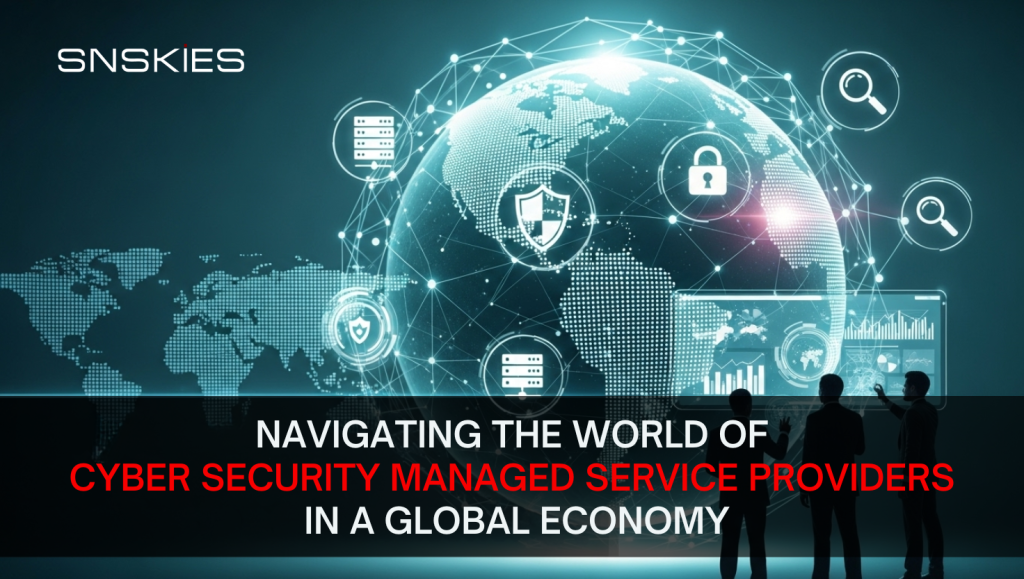
Articles How to Stop a DDoS Attack: Comprehensive Guide to Protection and Mitigation Articles How to Stop a DDoS Attack: Comprehensive Guide to Protection and Mitigation Articles August 15, 2025 In today’s interconnected digital world, where cyber threats transcend borders, businesses increasingly turn to cyber security managed service providers for comprehensive protection. These providers offer outsourced expertise to manage complex security landscapes, enabling organizations to thrive without the burden of in-house operations. SNSKIES emerges as a leader in this domain, delivering innovative, scalable solutions tailored for global enterprises. With a focus on proactive threat management and regulatory compliance, SNSKIES helps businesses worldwide mitigate risks like ransomware, phishing, and advanced persistent threats (APTs). This article explores how SNSKIES, as premier cyber security service providers, optimizes security across diverse business sectors, aligning with Google’s evolving algorithms that emphasize topical depth, user intent, and authoritative content for enhanced worldwide traffic. Semantic optimization under the latest Google search updates prioritizes helpful, experience-based insights. By incorporating related entities such as threat intelligence, endpoint security, and zero-trust architectures, this content builds topical authority while addressing global search queries in regions like North America, Europe, Asia, and the Middle East. How Cyber Security Managed Service Providers Like SNSKIES Support Key Business Sectors SNSKIES customizes its cyber security managed service providers offerings to address sector-specific vulnerabilities, drawing on over 18 years of expertise. Their global Security Operations Centre (SOC) provides 24/7/365 monitoring, detection, and response, ensuring seamless protection for industries operating across continents. Telecom: Defending Against Network Vulnerabilities In the telecom sector, where IoT devices and high-volume data flows are commonplace, SNSKIES excels as cyber security service providers by safeguarding against DDoS attacks and ensuring regulatory compliance. Their managed services include real-time threat hunting and network security enhancements, supporting providers in regions like Pakistan, the Middle East, and beyond. By implementing advanced deep packet inspection (DPI) and web filtering, SNSKIES enables telecom firms to maintain 100% compliance while handling massive international traffic, fostering operational efficiency in a globally competitive market. Finance: Securing Transactions and Data Integrity Financial institutions face relentless threats to transactions and sensitive data. SNSKIES, as trusted cyber security managed service providers, deploys AI-driven analytics and encryption to combat fraud in cloud-based banking environments. Serving Europe, Asia, and North America, their solutions ensure adherence to standards like GDPR and NIST, reducing risks from phishing and insider threats. This proactive approach minimizes downtime and builds customer trust, allowing financial entities to expand securely across global markets. Government: Protecting Public Infrastructure Government agencies handle critical public data, making them targets for state-sponsored attacks. SNSKIES provides cyber security service providers expertise through secure infrastructure and incident response strategies aligned with regional regulations in South Asia and worldwide. Their managed SOC offers continuous monitoring for public portals and data centers, incorporating zero-trust models to prevent breaches. This enables governments to deliver services reliably, enhancing national security in an era of geopolitical cyber risks. Healthcare: Safeguarding Patient Information Healthcare providers manage vast amounts of personal health data, requiring stringent protections. As leading cyber security managed service providers, SNSKIES ensures HIPAA-compliant solutions for electronic health records and telemedicine. Their global services include vulnerability management and endpoint detection, helping clinics and hospitals in diverse regions prevent data leaks. By automating responses to threats like malware, SNSKIES supports uninterrupted patient care while complying with international privacy laws. Retail and E-Commerce: Preventing Fraud in Digital Sales Retailers operating online face e-commerce-specific risks such as payment fraud and supply chain attacks. SNSKIES delivers cyber security service providers solutions with web application security and behavior analytics, tailored for global expansion. Serving markets from North America to emerging economies, their managed services detect anomalies in real-time, protecting customer interactions and boosting confidence in cross-border transactions. Manufacturing: Securing Industrial Operations The manufacturing sector, reliant on industrial IoT and supply chains, benefits from SNSKIES’s cyber security managed service providers through robust defenses against espionage and disruptions. Their offerings include automated threat response and network segmentation, ensuring resilience for factories worldwide. By addressing vulnerabilities in control systems, SNSKIES promotes efficiency and compliance, supporting manufacturers in Asia, Europe, and beyond. Service Providers and IT/Cloud Firms: Enabling Multi-Tenancy Security For IT and cloud service providers, SNSKIES offers scalable, multi-tenant cyber security service providers frameworks. Their global SOC integrates orchestration and automation for efficient threat management, catering to diverse clients. This facilitates secure cloud transformations and DevOps environments, driving innovation across international operations. Core Advantages of SNSKIES as Cyber Security Managed Service Providers Partnering with SNSKIES brings transformative benefits for global businesses: Continuous Protection: 24/7 SOC monitoring with advanced tools for threat detection and response. Cost-Effective Expertise: Reduces overhead by outsourcing to specialists, avoiding skills shortages. Compliance Mastery: Aligns with global standards like GDPR, NIST, HIPAA, ensuring seamless international operations. Scalable Solutions: Adapts to business growth, with fast onboarding and real-time customer portals. Innovative Defenses: Leverages AI, encryption, and training simulations to stay ahead of evolving threats. These features enhance semantic relevance, matching user searches for reliable, geo-agnostic security providers. Why Choose SNSKIES for Global Cyber Security Needs With a client-centric approach and worldwide delivery hubs, SNSKIES stands out among cyber security managed service providers. Their R&D-driven innovations, such as machine learning analytics and high-uptime solutions, empower businesses to navigate digital challenges confidently. Focusing on resilience and growth, SNSKIES ensures organizations worldwide achieve competitive edges through superior security. Conclusion: Strengthen Your Global Business with SNSKIES Cyber Security Services As cyber risks intensify, selecting expert cyber security managed service providers like SNSKIES is crucial for sectoral success. Their cyber security service providers solutions offer unmatched protection, compliance, and innovation for businesses everywhere. Contact SNSKIES today to elevate your security strategy and drive worldwide growth. Recent Post All Posts Articles Navigating the World of Cyber Security Managed Service Providers in a Global Economy August 26, 2025/ Managed Cyber Security Services: SNSKIES’ Global Solutions for Business Protection August 22, 2025/ How to Stop a DDoS Attack: Comprehensive Guide to Protection and Mitigation August 15, 2025/ Older Posts
Managed Cyber Security Services: SNSKIES’ Global Solutions for Business Protection
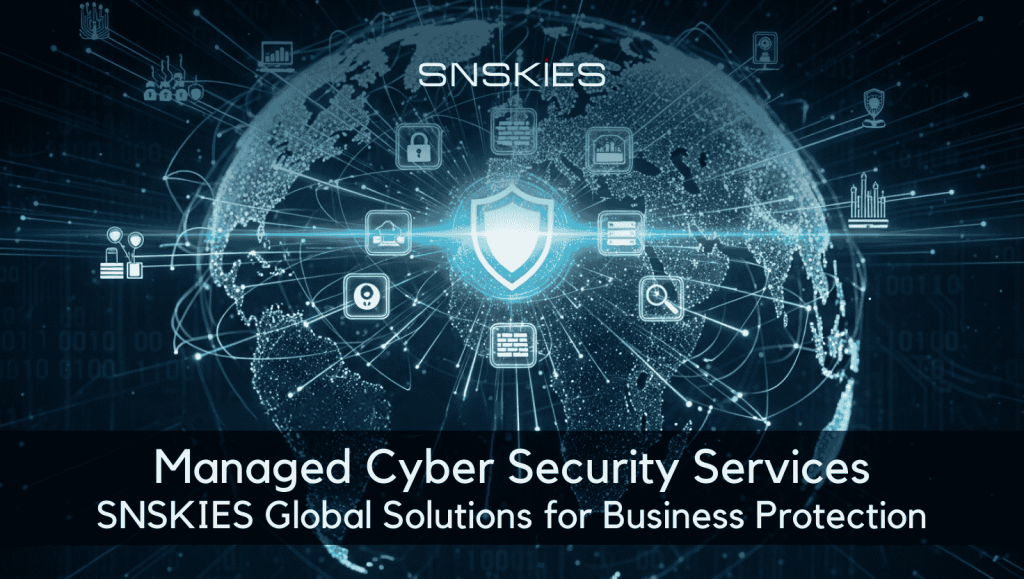
Articles Managed Cyber Security Services: SNSKIES’ Global Solutions for Business Protection Articles Managed Cyber Security Services: SNSKIES’ Global Solutions for Business Protection Articles August 22, 2025 In an era of rising cyber threats, managed cyber security services provide essential defense for businesses worldwide. SNSKIES leads with comprehensive cyber security managed services, offering 24/7 monitoring, threat detection, and response through its global Security Operations Centre. Serving regions from North America to Asia and the Middle East, SNSKIES ensures scalable protection without in-house overhead. What Are Managed Cyber Security Services? Managed cyber security services outsource expert security to providers like SNSKIES, handling vulnerability assessments, incident response, and compliance. Using tools like SIEM, SOAR, and EDR, SNSKIES delivers proactive cyber security managed services based on NIST frameworks, covering identification, protection, detection, response, recovery, and governance. Benefits include cost savings, real-time threat intelligence, and adaptability for global operations, complying with standards like GDPR and NIST across the US, UK, India, UAE, and beyond. SNSKIES’ Cyber Security Managed Services Across Key Sectors SNSKIES customizes managed cyber security services for diverse industries: Telecom: Protects networks from DDoS and IoT vulnerabilities, ensuring compliance with FCC or TRAI for providers in Pakistan, Middle East, and worldwide. Finance: Secures transactions against fraud with AI analytics, supporting cloud banking in Europe, Asia, and North America. Government: Defends public data from state threats, aligning with regional regulations for agencies in South Asia and globally. Service Providers & Emerging Sectors: Offers multi-tenancy for IT/cloud firms; extends to healthcare (HIPAA-compliant patient data), retail (e-commerce fraud prevention), and manufacturing (industrial IoT security). With 18+ years of expertise, SNSKIES processes up to 9000 events per second using FORTINET SIEM and Qualys VMDR, plus staff training via CyberRange. Why Choose SNSKIES for Cyber Security Managed Services? SNSKIES delivers worldwide scalability, fast onboarding, and a customer portal for real-time insights. In a borderless threat landscape, these managed cyber security services build resilience against ransomware, phishing, and more. Secure your business today—contact SNSKIES at enquiries@snskies.com for tailored cyber security managed services that drive global protection and growth. FAQs About Managed Cyber Security Services What are managed cyber security services? Managed cyber security services involve outsourcing security tasks like monitoring, threat detection, and incident response to experts like SNSKIES, using advanced tools to protect businesses from cyber threats. How does SNSKIES ensure compliance with regulations? SNSKIES aligns its services with standards like GDPR, NIST, HIPAA, FCC, and TRAI, tailoring solutions to meet regional and industry-specific regulatory requirements. Which industries does SNSKIES serve? SNSKIES provides cyber security for telecom, finance, government, healthcare, retail, manufacturing, and IT/cloud service providers, with customized solutions for each sector. What tools does SNSKIES use for cyber security? SNSKIES employs tools like FORTINET SIEM, Qualys VMDR, SOAR, and EDR, processing up to 9000 events per second, alongside CyberRange for staff training. How quickly can SNSKIES onboard a new client? SNSKIES offers fast onboarding with a scalable approach, ensuring businesses gain immediate access to a customer portal and 24/7 security monitoring.
How to Stop a DDoS Attack: Comprehensive Guide to Protection and Mitigation
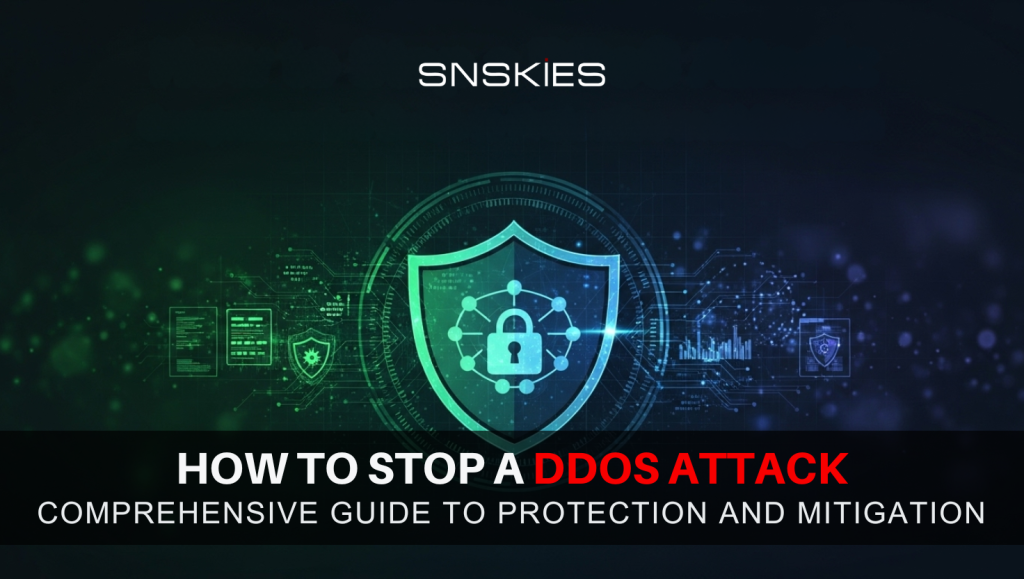
Articles What Certifications Should I Get for Cyber Security? | SNSKIES Global Guide 2025 Articles What Certifications Should I Get for Cyber Security? | SNSKIES Global Guide 2025 Articles August 5, 2025 In today’s interconnected digital landscape, understanding how to stop a DDoS attack is crucial for maintaining online availability and security. A DDoS attack, or distributed denial of service attack, can cripple websites, applications, and networks by flooding them with malicious traffic. As cyber threats evolve, businesses worldwide must prioritize robust defenses to safeguard their operations. SNSKIES, a leading provider of advanced cybersecurity solutions, specializes in managed DDoS protection services, Web Application Firewall (WAF), and Content Delivery Network (CDN) integrations designed to mitigate these risks effectively. This guide explores the mechanics of DDoS attacks, their types, impacts across various business sectors, and proven strategies to stop them, ensuring semantic relevance for modern search algorithms focused on user intent, expertise, and global accessibility. What is a DDoS Attack? A DDoS attack is a sophisticated form of cyber assault where multiple compromised systems—often part of a botnet—are used to target a single victim, overwhelming it with excessive traffic or requests. Unlike a traditional Denial of Service (DoS) attack from a single source, a DDoS attack leverages distributed sources, making it harder to trace and block. This results in disrupted services, slowed performance, or complete unavailability for legitimate users. The rise of DDoS-for-hire services has democratized these attacks, allowing even non-technical actors to launch them for as little as a few dollars. Globally, organizations face increasing threats, with attacks targeting everything from small e-commerce sites to large enterprises. Learning how to stop a DDoS attack involves proactive measures, real-time detection, and rapid response to minimize downtime and financial losses. How Does a DDoS Attack Work? At its core, a DDoS attack exploits vulnerabilities in network protocols and infrastructure to exhaust resources. Attackers generate massive volumes of data packets or requests, flooding the target’s bandwidth, processing power, or memory. These attacks align with the Open Systems Interconnection (OSI) model layers: Network Layer (Layer 3): Involves IP spoofing and ICMP floods to saturate bandwidth. Transport Layer (Layer 4): Targets TCP/UDP protocols, such as SYN floods that exploit handshake processes. Presentation Layer (Layer 6): Manipulates data formats to cause crashes. Application Layer (Layer 7): Mimics legitimate user behavior with HTTP floods, overwhelming web servers. The attack begins with reconnaissance, followed by botnet recruitment via malware. Once activated, the botnet directs traffic toward the victim, amplifying the assault through reflection techniques like DNS amplification. Without proper defenses, recovery can take hours or days, emphasizing the need for strategies on how to stop a DDoS attack swiftly. Common Types of DDoS Attacks DDoS attacks vary in complexity and focus, but they generally fall into three primary categories: Volumetric DDoS Attacks These are the most straightforward, aiming to consume all available bandwidth with junk data. Examples include UDP floods and ICMP (ping) floods, where amplified traffic can reach terabits per second, making the target inaccessible. Protocol DDoS Attacks Focused on exploiting protocol weaknesses, these attacks target stateful mechanisms like TCP connections. SYN floods, for instance, send incomplete connection requests, exhausting server resources without ever completing the handshake. Application DDoS Attacks The most insidious type, these mimic normal user traffic at Layer 7. HTTP GET/POST floods overwhelm web applications by requesting resource-intensive pages repeatedly, often evading basic filters. Additionally, attacks can be classified as: Application Layer Attacks: Directly target software vulnerabilities, such as slowloris attacks that hold connections open indefinitely. Infrastructure Layer Attacks: Hit underlying hardware and networks, including amplification attacks using public servers like NTP or DNS. Emerging variants, such as ReDoS (Regex Denial of Service) and hybrid attacks combining multiple types, highlight the need for adaptive defenses. Impacts of DDoS Attacks on Business Sectors DDoS attacks pose significant risks across diverse business sectors, disrupting operations and eroding trust. In the e-commerce sector, attacks during peak seasons like Black Friday can lead to lost sales and cart abandonments, costing millions in revenue. Financial institutions face regulatory penalties and customer churn from downtime in online banking services. The gaming industry suffers from lag and server crashes, alienating players and damaging esports reputations. Healthcare providers risk patient safety if telemedicine or electronic records become unavailable. Government and public services experience eroded public confidence during attacks on critical infrastructure. In manufacturing and supply chain sectors, IoT-connected devices become entry points, halting production lines. Media and entertainment platforms lose ad revenue from streaming interruptions. SNSKIES tailors its DDoS mitigation solutions to these sectors, offering global coverage to protect against region-specific threats, such as those amplified in high-traffic areas like North America, Europe, Asia-Pacific, and emerging markets in Africa and Latin America. By focusing on semantic signals like threat intelligence and real-time analytics, SNSKIES ensures worldwide businesses maintain resilience against these pervasive cyber risks. Protection and Mitigation Techniques Using Managed DDoS Protection Service, WAF, and CDN Effective protection against DDoS attacks requires layered defenses. SNSKIES provides integrated managed Distributed Denial of Service (DDoS) protection services that automatically detect and scrub malicious traffic at the edge. This includes always-on monitoring and AI-driven anomaly detection to identify attacks in seconds. A Web Application Firewall (WAF) from SNSKIES acts as a reverse proxy, inspecting HTTP traffic for Layer 7 threats and blocking exploits like SQL injection or XSS while allowing legitimate requests. Custom rules and rate limiting further enhance protection. Complementing this, SNSKIES’s Content Delivery Network (CDN) distributes content across global nodes, absorbing volumetric attacks by dispersing traffic and caching static assets to reduce origin server load. This trio—managed DDoS service, WAF, and CDN—forms a comprehensive shield, ensuring low-latency performance and high availability for users worldwide. 10 Best Practices to Prevent DDoS Attacks Preventing DDoS attacks demands a proactive approach. Here are 10 expert-recommended best practices: Monitor Network Traffic: Baseline normal patterns to detect anomalies early. Develop a Response Plan: Outline roles, communication, and escalation procedures. Reduce Attack Surface: Minimize exposed ports and use geo-blocking where appropriate. Implement Rate Limiting: Cap requests per IP to